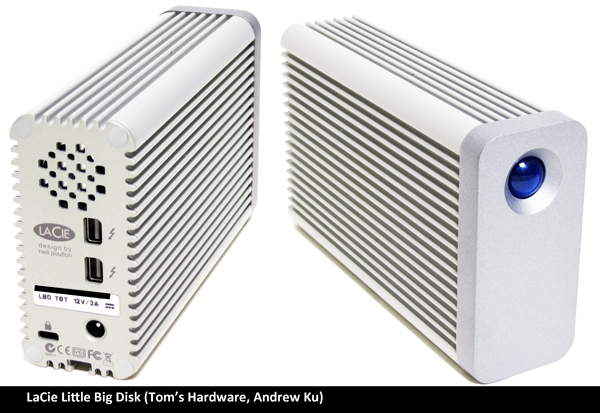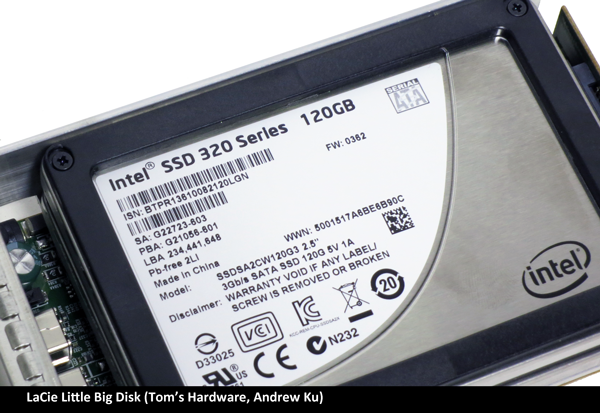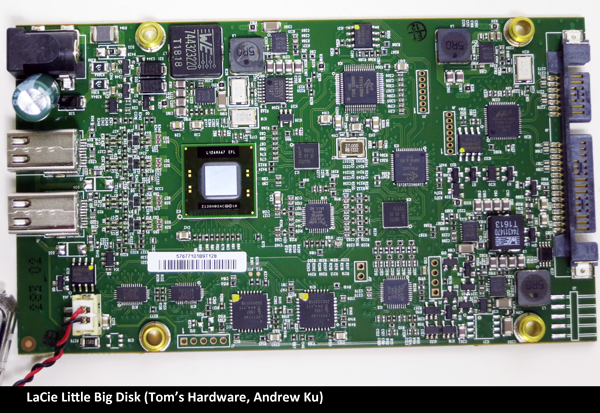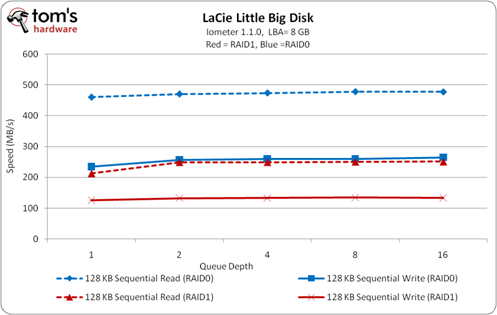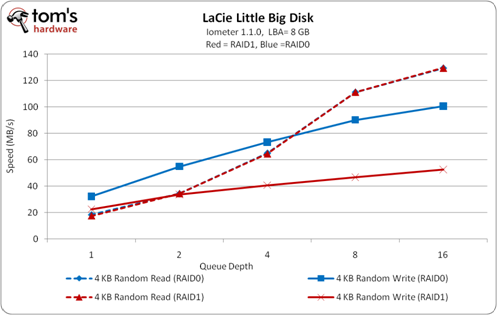Nine External Thunderbolt Storage Devices, Rounded Up
LaCie Little Big Disk 240 GB
| SKU | 9000310 | 9000106 | 9000107 | 9000243 |
|---|---|---|---|---|
| RPM | 5400 RPM | 7200 RPM | 5400 RPM | SSD |
| Capacity | 1 TB | 1 TB | 2 TB | 240 GB |
| Devices | 2 x 500 GB | 2 x 500 GB | 2 x 1 TB | 2 x 120 GB |
| Price (MSRP) | $380 | $450 | $549 | $849 |
| Market Price | $350 | $390 | $500 | $735 |
LaCie’s Little Big Disk (LBD) is available in four trims: 1 TB (2 x 500 GB, 5400 RPM), 1 TB (2 x 500 GB, 7200 RPM), 2 TB (2 x 1 TB, 5400 RPM), and 240 GB (2 x 120 GB, SSD). The 240 GB model, which is what LaCie submitted for review, is unquestionably the most interesting. It's the first Thunderbolt-based device we have seen with SSDs in RAID. That's perfect for pushing the interface's performance, providing the company picks the right drives.
LaCie touts the Little Big Disk as a "portable powerhouse," and SSDs drive that message home quite effectively. However, we do end up with critical feedback to pass along. Contrary to LaCie’s product photos, the Little Big Disk requires a separate AC adapter for daisy chaining because Thunderbolt, in its current form, does not supply enough power to run everything off of bus power.
Our enthusiasm is further dampened by the fact that LaCie chose to employ Intel’s 120 GB SSD 320. Don't get us wrong, we've found the SSD 320 to be incredibly reliable. It's just not a great-performing drive. You'd get better benchmarks results from any number of more modern 6 Gb/s-capable SSDs. But before you consider a do-it-yourself replacement, bear in mind that you'd be voiding LaCie's warranty. Four screws on the back of the drive are resin-coated, making it easy to tell if the chassis is opened.
All of LaCie's Little Big Disk models employ the same Intel CV82524EF/L Thunderbolt and Marvell 88SE9182 SATA controllers.
Queue depth appears to have no impact on performance, which is good news if you don't have one of those rigorous storage workloads needed to extract peak performance from many SSD-based products.
In RAID 0, sequential reads even out at ~470 MB/s, while writes peak around 250 MB/s. Using relatively low-capacity SSDs makes it hard to imagine a scenario where RAID 1 would make sense, but we generated those numbers anyway, if only as an interesting comparison to what RAID 0 does for throughput. And, as expected, when we limit the Little Big Disk to the capabilities of a single SSD 320, its sequential reads max out at ~250 MB/s, while sequential writes fall to ~125 MB/s.
Unfortunately, the SSD 320's random performance results are fairly modest, so the numbers we see aren't as spectacular as what you might otherwise expect from a modern SSD. The 4 KB random reads slowly climb from ~20 MB/s to ~130 MB/s, with no correlation to RAID configuration. We see that 4 KB random writes max out at 100 MB/s in RAID 0; RAID 1 achieves up to ~50 MB/s.
Get Tom's Hardware's best news and in-depth reviews, straight to your inbox.
Current page: LaCie Little Big Disk 240 GB
Prev Page G-Technologies G-RAID Thunderbolt 8 GB Next Page LaCie 2big 6 TB-
acku Reply9535164 said:No benchmark for 8-drive Thunderbolt deivces such as Areca ARC-8050 ?
What the R6 isn't expensive enough? :p Honestly, we couldn't include the ARC-8050 (http://www.areca.com.tw/products/thunderbolt.htm) because it's not readily available for purchase (yet).
Cheers,
Andrew Ku
TomsHardware.com -
mayankleoboy1 storage is OK, but an externally powered GPU is the most interesting application of thunderbolt.Reply
with the external PCI-E device specification coming soon, i believe the days of thunderbolt are limited. -
web2dot0 mayankleoboy1storage is OK, but an externally powered GPU is the most interesting application of thunderbolt.with the external PCI-E device specification coming soon, i believe the days of thunderbolt are limited.Reply
Thunderbolt IS ePCI-E. Well, using Intel's implementation. You think the specification will somehow make things cheaper? Nope. -
chovav Thank you Andrew for this review, it certainly makes it clear whether you should invest in thunderbolt or not.Reply
Could you maybe do add a random read/write graph comparing GoFlex Desk with USB3 and Thunderbolt?
I was also wondering what the CPU usage is during read/write - is there any impact at all? or does the thunderbolt controller bear all the processing grunt-work?
Thanks again, great article. -
CaedenV web2dot0Thunderbolt IS ePCI-E. Well, using Intel's implementation. You think the specification will somehow make things cheaper? Nope.thunderbolt is a medium that allows for multiple interconnect protocols to be transmitted over the same wire. It can send PCIe, it can send DP, it was supposed to be able to send USB 1/2/3, as well as Ethernet, all over the same wire... but we have not seen that happen over the copper version that was released.Reply
The external PCIe will be cheaper and easier because it will be hosted directly by the mobo chipset, or the CPU by tapping into already existing hardware. Chip makers will not have to add a new and expensive tech to the device, the connection will just siphon off lanes that are already there. And because it is already standardized and cheap technology it will be easier and cheaper to implement. Finally it will be an open standard that multiple manufacturers can adopt. Thunderbolt (as much as I love the idea) is made and operated by Intel, and Intel wants to charge a premium for it. Until there are multiple chip makers who can make it, then it will continue to be too expensive... and when multiple chip makers can make it then Intel will be the only one worth buying (much like their network interfaces) because nobody can do quality like intel, but at least the price will come down. -
mayankleoboy1 ^ like the Marvell SATA controllers.Reply
And thunderbolt is not going optical fibre in the coming years. the cable is too expensive and cant carry much power.
and the fact that apple is using it gives some clues about its price, compatibility, usability and openness.
i remember how TB was promoted : one single wire from your PC to a TB brick. and from that brick you added USB, ethernet, firewire, DP, HDMI. basically it was touted as "1 wire for everything". supposed to be magical, and we all know how that turns out.
-
acku CaedenVthunderbolt is a medium that allows for multiple interconnect protocols to be transmitted over the same wire. It can send PCIe, it can send DP, it was supposed to be able to send USB 1/2/3, as well as Ethernet, all over the same wire... but we have not seen that happen over the copper version that was released.The external PCIe will be cheaper and easier because it will be hosted directly by the mobo chipset, or the CPU by tapping into already existing hardware. Chip makers will not have to add a new and expensive tech to the device, the connection will just siphon off lanes that are already there. And because it is already standardized and cheap technology it will be easier and cheaper to implement. Finally it will be an open standard that multiple manufacturers can adopt. Thunderbolt (as much as I love the idea) is made and operated by Intel, and Intel wants to charge a premium for it. Until there are multiple chip makers who can make it, then it will continue to be too expensive... and when multiple chip makers can make it then Intel will be the only one worth buying (much like their network interfaces) because nobody can do quality like intel, but at least the price will come down.Reply
Read http://www.tomshardware.com/reviews/thunderbolt-performance-z77a-gd80,3205.html Thunderbolt can externalize anything. It just has to have the controller. It is external PCIe. External USB 3.0 and ethernet are possible but unlikely because they are already on the mobo.
From a practical standpoint, external PCIe may cheaper, but it's pointless from a performance standpoint http://en.wikipedia.org/wiki/PCI_Express#External_PCIe_cards. Everything is limited to a PCIe 1.0 x1 connection. The new ExpressCard standard (v2.0) ups bandwidth to slightly more than PCIe 1.0 x2, which still isn't that fast compared to TB (PCIe 2.0 x4 uplink). Plus ExpressCard only lets you connect a single device. It's one and done after that. For a mobile user, Thunderbolt is the way to go. Worse, you can't count on EC to be available. I'm already seeing Ultrabooks with TB. It makes sense because it doesn't require a lot of space. EC requires more space, hence it will be a greater rarity now that TB is out.
It looks expensive now but be patient. TB is something you will want. Many people need to look past the role Apple played. It clearly is a performance oriented technology that opens up a whole new world, especially on the mobile side.
Cheers,
Andrew Ku
Tom's Hardware.com
-
web2dot0 CaedenVthunderbolt is a medium that allows for multiple interconnect protocols to be transmitted over the same wire. It can send PCIe, it can send DP, it was supposed to be able to send USB 1/2/3, as well as Ethernet, all over the same wire... but we have not seen that happen over the copper version that was released.The external PCIe will be cheaper and easier because it will be hosted directly by the mobo chipset, or the CPU by tapping into already existing hardware. Chip makers will not have to add a new and expensive tech to the device, the connection will just siphon off lanes that are already there. And because it is already standardized and cheap technology it will be easier and cheaper to implement. Finally it will be an open standard that multiple manufacturers can adopt. Thunderbolt (as much as I love the idea) is made and operated by Intel, and Intel wants to charge a premium for it. Until there are multiple chip makers who can make it, then it will continue to be too expensive... and when multiple chip makers can make it then Intel will be the only one worth buying (much like their network interfaces) because nobody can do quality like intel, but at least the price will come down.Reply
Thank you for your Wikipedia quote. Everybody can quote from the spec sheet. The trouble is you make it seem like Intel are bunch of morons building a interconnect that nobody uses. That's is plain wrong. Just like SSDs, they will come down in price and next thing you know, you'll be asking yourself why in the world would I not use Thunderbolt. Imagine running a external GPU on your Retina Display MacbookPro when you dock your laptop. There'll be a lineup of people buying that technology at a premium price.
Partnering with Apple is no accident. 2 giant corporations backing the initiative is nothing to sneeze at. Give it a few years, and you'll soon find out the true power of Thunderbolt. USB 3.0 complements Thunderbolt.
